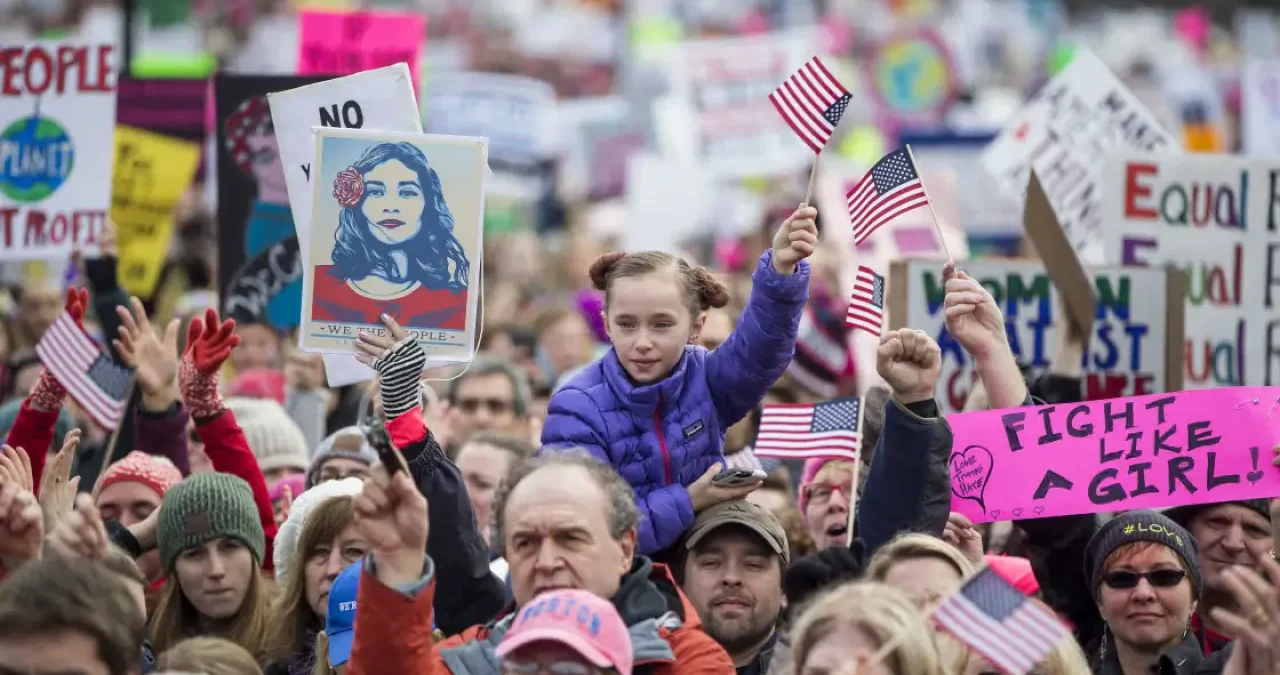Trump’s Second Inauguration: Fewer Protests, Shifting Resistance
Trump’s Second Inauguration: A Quieter Stage, Fewer Protests, and Changing Dynamics

Trump’s Second Inauguration: A Quieter Stage, Fewer Protests, and Changing Dynamics
Donald Trump’s first inauguration in 2017 was a historic flashpoint, marked by fiery protests and the birth of a resistance movement that dominated headlines for years. Yet, as his second swearing-in approaches, the landscape has shifted dramatically, with fewer protests, reduced celebrity involvement, and even Democratic lawmakers now feeling compelled to attend.
The inauguration, coinciding with Martin Luther King Jr. Day, will see smaller demonstrations compared to the millions who took to the streets in 2017, making it the largest single-day protest in U.S. history. The fervor that once defined the anti-Trump “Resistance” has waned, leaving many to question the impact of their earlier efforts.
- Resistance Fades as Trump Gains Momentum
Trump’s reelection marks the first time he has secured the popular vote, emboldening his supporters and weakening opposition efforts. His approval ratings have hit a historic high, with Americans showing increased optimism about issues like the economy and immigration under his leadership.
“This isn’t 2017 anymore,” noted Democratic strategist Donna Brazile. “The resistance that fueled massive protests has cooled significantly.”
This shift in tone is evident not only among activists but also in corporate boardrooms. Companies that once aligned with progressive causes are now sending CEOs to Trump’s inauguration and contributing to his inaugural committee.
- Democrats Grapple with Attendance
While over 60 Democratic lawmakers boycotted Trump’s first inauguration, this time, far fewer are planning to sit out. Some absences are attributed to personal reasons rather than deliberate boycotts. For example, former House Speaker Nancy Pelosi is recovering from surgery and will not attend, while progressive firebrand Alexandria Ocasio-Cortez cited scheduling conflicts for her absence.
Even vocal Trump critics like Rep. Jared Huffman (D-Calif.), who boycotted the 2017 event, are attending this year. “Like it or not, this guy was just reelected with full disclosure of who he is,” Huffman said.
Arizona Senator Ruben Gallego echoed this sentiment, emphasizing the importance of bipartisan cooperation. “The electorate has made it clear they want Democrats and Republicans to work together,” he told local media.
- Protests Lose Steam
Demonstrations planned for this weekend are expected to draw far smaller crowds than in 2017. The People’s March, organized by groups behind the Women’s March, has fewer than 50,000 RSVPs — a stark contrast to the estimated 500,000 participants in Washington alone during Trump’s first inauguration.
Even satellite protests are seeing diminished interest. In West Palm Beach, near Trump’s Mar-a-Lago resort, fewer than 300 people have RSVP’d, while a New York City event has just 1,500 confirmations.
Civil rights leader Rev. Al Sharpton will honor Martin Luther King Jr. with a rally at a historic Black church in Washington, but even this event reflects the quieter tone of 2025.
Women’s March co-founder Vanessa Wruble summed up the sentiment when she told the BBC, “I didn’t even know [anti-inauguration protests] were still a thing.”
- Celebrity Silence Speaks Volumes
In 2017, Hollywood’s elite amplified the resistance movement, with passionate speeches at the Golden Globes and high-profile appearances at marches. This time, the celebrity response is muted.
Carrie Underwood is slated to perform at Trump’s inauguration, drawing some backlash but also surprising defenders like Whoopi Goldberg. Meanwhile, the Golden Globes this year avoided direct political commentary, offering only vague nods to the nation’s challenges.
The star-studded Women’s Marches of 2017, featuring Scarlett Johansson, Emma Watson, and Alicia Keys, have given way to a less glamorous lineup. Saturday’s march will feature activists rather than A-list celebrities, reflecting a shift in the cultural landscape.
Comedian Josh Gondelman observed on social media, “Entertainment is less squeamish about Trump now. Resistance culture is giving way to pandering to imagined Trump voters.”
- Looking Ahead
While Trump’s inauguration will likely proceed with less resistance than before, it will be closely followed by the annual anti-abortion March for Life, which organizers predict will draw 150,000 participants — triple the turnout expected for anti-Trump protests.
This evolving dynamic underscores how much the political and cultural landscape has changed since 2017. For Trump supporters, the subdued opposition marks a victory. For critics, it’s a sobering reminder of how challenging sustained resistance can be.
As America enters another chapter of the Trump presidency, one thing is clear: the energy and strategy of both supporters and opponents will continue to shape the nation’s future.
Source: NBCNEWS



